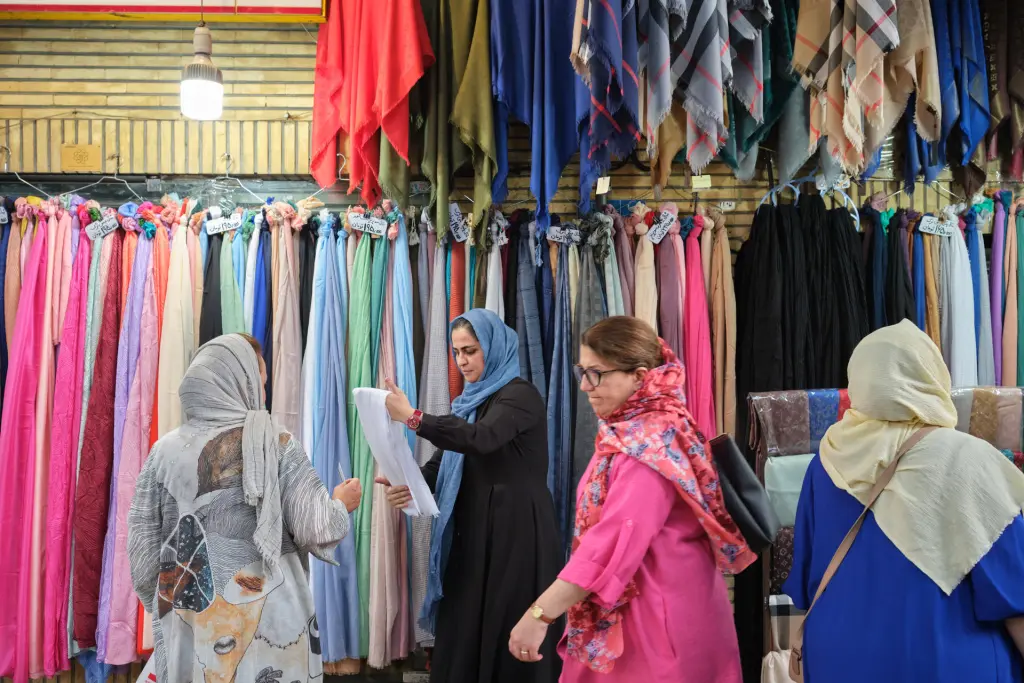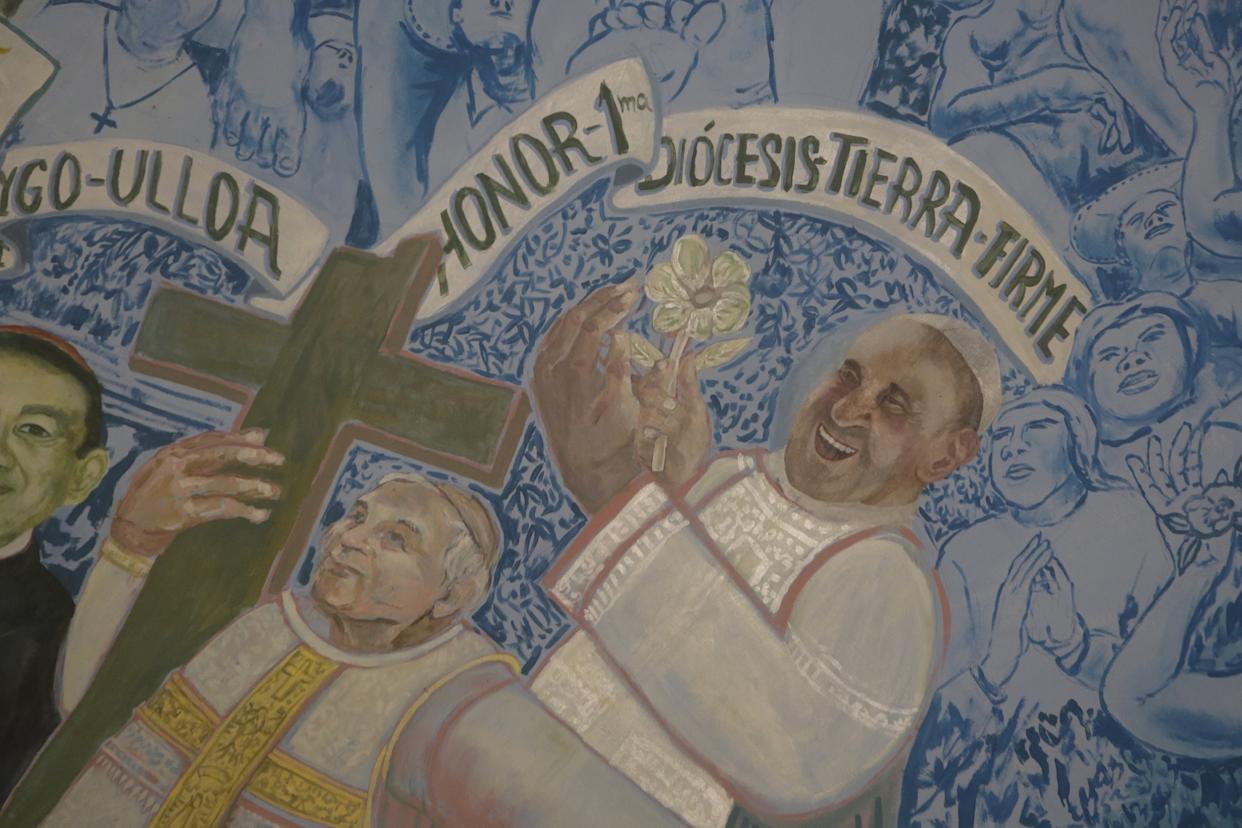International
The sale of hijabs skyrockets in Iran due to the fear of the ‘Police of morality’

The veil seller Mahshid is doing well. The sale of hijabs has skyrocketed in his store in northern Tehran since the return to the streets of the ‘Police of Morals’ to reimpose the use of Islamic clothing, a situation that other businesses in the sector are also experiencing.
Numerous women look and touch veils, ask for prices and several wear clothes at the Mahshid store located in Tajrish Square, a business that sank after the death of Mahsa Amini in 2022 after being arrested for not wearing the hijab well.
“Many women stopped shopping and wearing the veil then. Sales were reduced to less than half,” he tells EFE Mahshid, who at 34 years old has had covered hair and has been selling hijabs for a decade.
“But with the return of the ‘Police of Morals’ to the streets, sales have recovered,” says this merchant who sells veils from 1,350,000 rials (2.5 euros) and has them in all colors and prints.
Sales have not fully recovered and Mahshid now dispatches 75% of what he sold before the death of the 22-year-old Kurdish girl, which provoked unprecedented protests against the Islamic Republic in which 500 protesters died in state violence.
After Amini’s death, many Iranians stopped wearing the Islamic veil as a gesture of social disobedience to a political system that they consider oppressive and discriminatory, especially against women.
To reimpose the use of the veil, the Iranian authorities launched a campaign of massive repression with the confiscation of vehicles, prison sentences and even lashes, Amnesty International denounced.
In vain. Many Iranians have continued without covering their hair and that is why in mid-April the authorities deployed the ‘Moral Police’ back on the streets of the country and since then arrests women who do not wear a veil, a mandatory garment in the country since 1983.
Afshin, a veil seller in a shopping center in northern Tehran, has also seen a significant increase in sales and believes that it is because of the fear of the dreaded police vans in which they put women sometimes forcibly discovered.
“Sales have improved in the last three months and I think it is due to the fear that many women feel about the violent arrests of girls who do not wear the veil,” this 36-year-old Iranian tells EFE.
Afshin sold 50 veils on weekdays and about 100 on holidays until Amini’s death in September 2022, after which sales fell to about 50 pieces per week.
“Now he has recovered a little. It’s not like three years ago, but we sell about 30 veils a day,” he explains.
One of the women who stopped wearing a veil in 2022 and has now covered her hair again is Melika, a 39-year-old housewife from Tehran.
“I stopped using the hijab as a form of solidarity with the young women who have paid very dearly for the fact of removing the veil,” he tells EFE.
“But after seeing the violent arrests of girls in the streets with the return of the police of morale, I began to use it in places where I know there are police vans,” he continues.
After two years without buying a veil, Melika bought one a few days ago: “It makes me feel bad to spend the money on something I don’t like and that they are forcibly imposing on me.”
Iran is now waiting for President-elect Masud Pezeshkian to take office at the end of the month and one of the great doubts is whether he will relax the veil policy, as he hinted in the electoral campaign.
“I don’t think he will, he has no power to do it,” a newly licensed psychologist tells EFE who doubts that the new reformist president will bring changes, a widespread opinion among young Iranians.
If so, the veil seller Mahshid will continue to do well.
International
DHS Secretary Kristi Noem’s Purse Stolen in D.C. Restaurant Heist

The purse of Kristi Noem, Secretary of the Department of Homeland Security, was stolen on Sunday night at a restaurant in Washington, D.C., Fox News Digital confirmed through several agency sources.
The handbag, taken by a white male wearing a mask, reportedly contained $3,000 in cash along with personal documents, including her passport, keys, driver’s license, and DHS badge, according to an agency spokesperson.
“Her entire family was in town, including her children and grandchildren. She was celebrating her retirement by treating them to dinner, activities, and Easter gifts,” the spokesperson added.
Crime continues to be a significant issue in the U.S. capital, particularly theft. However, violent crime reached its lowest level in 30 years last year, according to the Office of the Attorney General at the time.
International
Pope Francis: The Quiet Architect Behind the U.S.-Cuba Thaw

When then-U.S. President Barack Obama and Cuban President Raúl Castro announced the reestablishment of diplomatic relations in December 2014—after decades of hostility—there was a third figure present in both speeches: Pope Francis.
This thaw in U.S.-Cuba relations—later reversed by Donald Trump—was the result of behind-the-scenes negotiations personally encouraged by Pope Francis, who passed away on Monday at the age of 88, just over a year after becoming head of the Catholic Church.
Upon learning the news of the breakthrough, the pontiff humbly stated, “This was made possible thanks to the ambassadors and to diplomacy,” which he called “a noble, very noble job.”
In 2015, months after the announcement, Raúl Castro visited the Vatican and met with the pope. Over time, Castro developed a fondness for Francis that he never had for his predecessors, Benedict XVI and John Paul II. “If the Pope continues talking like this, sooner or later I’ll start praying again and return to the Catholic Church—and I’m not joking,” said the younger Castro, who, like his brother Fidel (1926–2016), had been educated by Jesuits—the same order to which Pope Francis belonged.
Pope Francis visited Cuba later that year. Just days before his arrival, the Cuban government announced the pardon of 3,522 common prisoners as an act of clemency.
While in Havana, the pope met with Fidel Castro, who gave him a first edition of the book Fidel and Religion by Brazilian friar and liberation theologian Frei Betto.
Criticism from the Opposition
Francis’s diplomatic approach also drew criticism from parts of the Cuban opposition. In a 2022 interview with Univision, the pope revealed he had “a human relationship” with Raúl Castro.
International
Dominican Republic Declares Three Days of Mourning for Pope Francis

Dominican Republic President Luis Abinader has declared three days of national mourning starting Tuesday following the death of Pope Francis, who passed away on Monday at the age of 88 in his residence at the Casa Santa Marta.
In an official decree, Abinader highlighted the pope’s legacy “as a global leader who promoted significant reforms within the Catholic Church and was known for his humility, openness to dialogue, and commitment to peace among nations.”
During the mourning period, the national flag will be flown at half-staff at military facilities and public buildings.
According to a statement from the Office of the Presidency, although Pope Francis never visited the Dominican Republic during his papacy, he maintained a close relationship with the country. He expressed solidarity and empathy during difficult times, including offering prayers for the victims of the recent tragedy at a Santo Domingo nightclub on April 8, which claimed 232 lives and left more than 180 injured.
-

 Central America4 days ago
Central America4 days agoNicaraguan Exiles to Mark 7th Anniversary of 2018 Protests with Global Commemorations
-

 International4 days ago
International4 days agoDominican ‘False Hero’ Arrested for Faking Role in Nightclub Collapse That Killed 231
-

 International3 days ago
International3 days agoACLU seeks emergency court order to stop venezuelan deportations under Wartime Law
-

 Central America3 days ago
Central America3 days agoUN complaint filed against Costa Rica over detention of migrant children
-

 International2 days ago
International2 days agoThousands rally nationwide against Trump’s threat to U.S. democracy
-

 Central America1 day ago
Central America1 day agoSenator Van Hollen Meets with Deported MS-13 Member in El Salvador; Trump and Bukele React
-

 International1 day ago
International1 day agoPope Francis Appears for Easter Blessing, Calls for Peace and Religious Freedom
-

 Central America3 hours ago
Central America3 hours agoCardinal Rodríguez to Attend Funeral of Pope Francis: “He Was Very Dear to Me”
-

 International2 hours ago
International2 hours agoDominican Republic Declares Three Days of Mourning for Pope Francis
-

 Central America3 hours ago
Central America3 hours agoNicaragua’s Ortega and Murillo Mourn Pope Francis, Acknowledge ‘Difficult’ Relationship
-

 International2 hours ago
International2 hours agoDHS Secretary Kristi Noem’s Purse Stolen in D.C. Restaurant Heist
-

 International2 hours ago
International2 hours agoPope Francis: The Quiet Architect Behind the U.S.-Cuba Thaw















